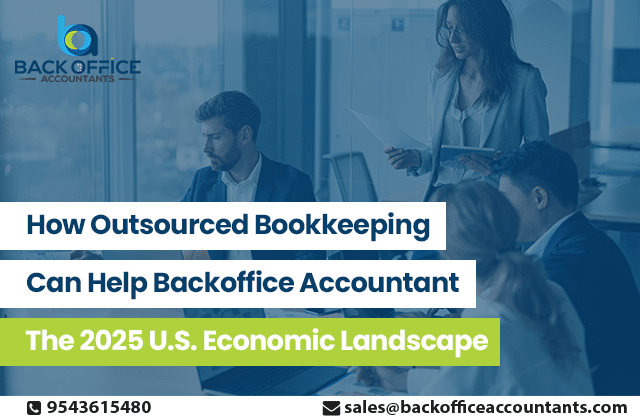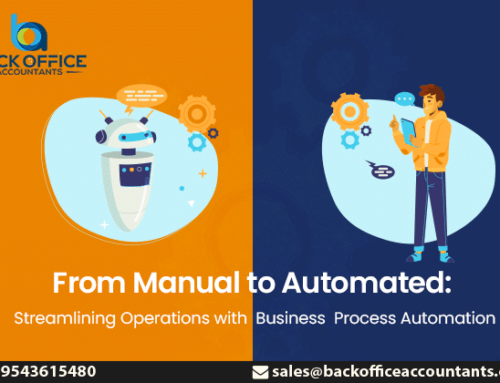Outsourcing accounting [functions like accounts payable processes] is a vital option for reducing the workload in any department. While the notion may be that only large businesses outsourced bookkeeping and accounting tasks, small businesses also outsource. Backoffice accountants are ideally the backbone of any organization’s financial operations.
The 2025 U.S Economic Landscape
Since businesses have adjusted to changing conditions and regulations and will continue to do so in the wake of the recent governmental change, the U.S. economic landscape is undergoing a significant positive shift. GDP growth has been predicted to stabilize at moderate levels.
The U.S. Small Business Administration reported in 2024 that SMEs now make up as much as 44% of the country’s GDP. Similarly, over 36% of US workers engage in freelance or contract work. Due to their substantial economic contribution, SMEs should take advantage of any favourable opportunities to stay afloat. As businesses grow and diversify, their financial operations become complex, hence the need to outsource.
A backoffice accountant may not be up-to-date with all the trends because they are busy with other assignments. A company that specializes in outsourced bookkeeping, on the other hand, trains its workers to keep up to date. They must understand the current economies, read projections, and present data and financial guidance to identify opportunities that small businesses can leverage in their professional field.
Misconceptions about Outsourcing Bookkeeping
Outsourcing bookkeeping services is surrounded by several myths, such as the idea that small businesses do not need it. It also raises concerns that one might lose control over one’s financial operations, which usually makes businesses sceptical about outsourcing. However, the best believe that outsourcing does more good than harm.
One major fear is loss of control. Businesses fear that outsourcing means giving up control over financial duties. Many companies now use collaborative tools to ensure that they can keep track of their work and maintain control with clear communication.
Data security is another issue. However, the company can take certain steps to ensure security. For example, the bookkeeping company can sign an NDA, use secure cloud-based platforms, and apply encryption.
Last but not least, the notion exists that outsourcing is costly. This simply ignores the long-term benefits.
Why Businesses Should Outsource Bookkeeping
If you were wondering if there were any outsourced bookkeeping benefits in 2025, here are some you should note.
- Cost Efficiency
Outsourcing bookkeeping helps save costs. While there may be initial costs, in the long run, it reduces expenses. If you choose to maintain an in-house accounting team, it will cause a hole in your pocket. Paying salaries, employee benefits, office space, and training are expensive. When you outsource, you bid farewell to all fixed costs and only pay for the services you need at the time.
- Expertise
The professional bookkeepers bring their level of expertise and years of knowledge with them. To reduce your risk of legal complications, they help you comply with all necessary laws and regulatory requirements.
- Focus on Core Business Activities
When accounting is outsourced, the business can focus on other activities, such as product development, sales, and customer service. SMEs can dedicate their time to upscaling.
Key Benefits to Acknowledge
Beyond mere cost savings, there are a range of other benefits that will now be explored.
- Enhanced Data Security
In-house management of financial data can expose you to the risk of internal fraud, theft, or data breaches. Outsourced Accounting firms take data security seriously and adopt measures to protect sensitive information.
They comply with strict confidentiality agreements. It creates a separation that minimizes whatever risk internal conflicts of interest may pose. By entrusting financial management to a third party, businesses can ensure unbiased handling of their accounts.
- Advanced Technology
Some accounting service providers use the newest technologies, such as cloud computing and artificial intelligence, to help them become more efficient. If you, as a small business, have access to these tools, it would help you improve your financial management.
- Risk Management
When companies choose to manage compliance and tax filings internally, it could expose their business to risks. Outsourcing Minimises these risks because professionals are entrusted with the burden. It also reduces dependency on a single accountant.
Conclusion
Many Small businesses doubt the viability of outsourced bookkeeping. Despite all the misconceptions, it is still very relevant and necessary. In the context of the economic challenges for U.S. businesses in 2025, the adoption of outsourced bookkeeping is a cost-effective measure and a strategic investment. One just has to do proper research on the companies or individuals offering these services to find the perfect one for their business.







